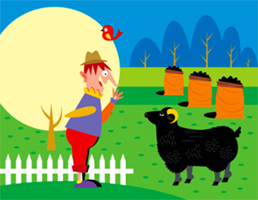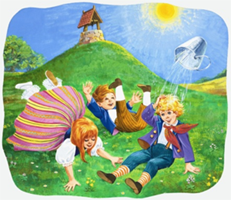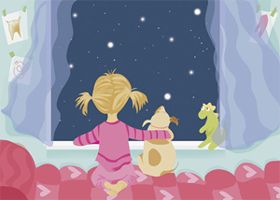Dec 25, 2025
Dec 25, 2025
Baa Baa Black sheep
Have you any wool
Yes sir yes sir, three bags full
One for my master, one for may dame
One for the little boy who lives down the lane
 There are five characters in this poem – the gentle one who queries and four more. The sheep politely and truthfully answers showing his duty and obligations to the master, love for the beloved and concern for the little boy. This poem portrays politeness, truth, duty, love (for women), innocence and concern for children. Is this not good!
There are five characters in this poem – the gentle one who queries and four more. The sheep politely and truthfully answers showing his duty and obligations to the master, love for the beloved and concern for the little boy. This poem portrays politeness, truth, duty, love (for women), innocence and concern for children. Is this not good!Jack and Jill
Went up the hill
To fetch a pail of water
Jack fell down, broke his crown
And Jill came tumbling after
 This poem has great societal and environmental value. Often the water reservoirs are constructed on hill tops for the following reasons: it is easier to supply the water using gravity gradient, it is free of usual pollutions and beyond the reach of people. This practice is prevalent to this day. It appears from the poem that Jack and Jill are a bit naughty. They had gone to fetch water by dipping the pail in the reservoir and perhaps had to rush back and in the process were wounded.
This poem has great societal and environmental value. Often the water reservoirs are constructed on hill tops for the following reasons: it is easier to supply the water using gravity gradient, it is free of usual pollutions and beyond the reach of people. This practice is prevalent to this day. It appears from the poem that Jack and Jill are a bit naughty. They had gone to fetch water by dipping the pail in the reservoir and perhaps had to rush back and in the process were wounded.Twinkle twinkle little star
How I wonder what you are
Up above the worlds so high
like a diamond in the sky
 New to the world the child is wonderstruck to see all around it. The distant stars and the sky are beyond his understanding, but soon it discovers the equivalents on the earth as diamond. On one side the heavenly bodies - the sky and the star and on the other the earth and diamond. The poem connects the divine and the human. More than that the child tries to explore the unknown, that later comes back as an eternal query for 'who am I?'
New to the world the child is wonderstruck to see all around it. The distant stars and the sky are beyond his understanding, but soon it discovers the equivalents on the earth as diamond. On one side the heavenly bodies - the sky and the star and on the other the earth and diamond. The poem connects the divine and the human. More than that the child tries to explore the unknown, that later comes back as an eternal query for 'who am I?'
19-Nov-2010
More by : Dr. Kumarendra Mallick

|
I shall visit the blog and get your profile and other details. Thank you. |

|
Dear Mr. Mallik, it is the translation not of Janmadine but of poem number 20 from that collection. And I would request you to consult the list of bloggers on boloji, click on TagoreBlog and you will be able to see my profile page and know my name and contact address. I usually translate Tagore from Bengali to English and blog on Rabindranath Tagore. You are welcome to my blogspage. |

|
Thank you so very much for providing the translation of Janmadine by Tagore. Very thoughtful f you indeed. But will you spell out your name so that I can get in touch with you. Best regards |

|
A lovely theme on which Rabindranath Tagore wrote a poem. Here it is in my translation, already published in boloji long ago. Nursery Rhymes Today it seems to me The sounds of words have become fully free Imprisoned long in the fortress of grammar They have become rebellious Without any rest For ages parading in goose steps They have become restive. Defying the rules of syntax They have taken their position at a vantage post Where everything is meaningless Where speech is free Breaking the manacles of meanings They ridicule the standard poems. Striking strange poses And leaving out everything else They aim to capture Only the ears! They say We are the progenies Of the sound of the very first wind That was breathed on this earth We came into being Soon after life, yet to have a mind, Quickened into consciousness. We have brought the first rhapsody of existence Uttered in his poem by the primordial child. We are the fountains Cascading on mountain peaks We have a kinship with the messengers of rains We have come to the populous plains Singing creation’s sacred hymns. Our symphony echoes in the forest foliage, Measures the rhythms of storms And with the departure of the night Raises a crescendo at the break of day. Men took sound by force like a wild pony Bound it with ropes of complex rules And made it a beast of burden To bear their messages far and wide. Mounting this muzzled horse Men have made all slow clocks fast. With their thought Overcoming the barrier of inert matter They have gone to unknown mysterious lands Disposing sound in various formations They always win their wars with the idiots. Sometimes like thieves They sneak into the kingdom of dreams Nothing can stop them When they drift along the ebb tide of sleep – Collecting a lot of flotsam and jetsam They arrange them in order With the help of rhythms The mind of men Unmindfully creates artistic things Loosely strung And far removed from the creation of God. Like a large litter of dogs Playing in a melee Without any rule One getting on another Or biting each other And barking in quarrelsome storms They are full of sound and fury But not ferocious at all. Whole day long I only see Breaking the manacles of meanings Sounds in crowds go to and fro Filling the whole sky With meaningless words. ----------------- Transcreation of poem 20 from the collection Janmadine by Rabindranath Tagore. |

|
Thank you, Dr Chandramouli. Nice to see you and read your nice comments. |

|
Thanks for sharing your joy with us.Good read. |

|
Thank you, Gopal Karuna Karan. It is great you are working with the children, the fresh flowers on this earth. Best regards, Mallick |

|
wonderful! I work with children and this piece does give new meaning to the teacher too! |